Space Exploration
Space exploration is the investigation and study of outer space using spacecraft, satellites, and other technology. It includes the study of celestial bodies such as planets, moons, stars, and galaxies, as well as phenomena such as cosmic radiation and dark matter. Space exploration has led to numerous discoveries and advancements in our understanding of the universe.
Key Concepts in Space Exploration
- History of Space Exploration: The history of space exploration dates back to the first successful launch of the Soviet satellite Sputnik 1 in 1957. Since then, various countries and organizations have launched missions to explore space, including manned missions to the Moon, Mars rovers, and telescopes in orbit.
- Types of Space Missions: Space missions can be classified into different categories, including robotic missions (unmanned spacecraft), manned missions (crewed spacecraft), and space telescopes (observatories in space).
- Technological Advances: Space exploration has driven technological innovation in areas such as propulsion systems, materials science, robotics, and telecommunications. These advances have also led to the development of various spin-off technologies that benefit life on Earth.
- Benefits of Space Exploration: Space exploration has contributed to our understanding of Earth's climate, natural disasters, and the origins of the universe. It has also led to the development of satellite communication, GPS technology, and medical imaging devices.
- Challenges of Space Exploration: Space exploration presents numerous challenges, including the harsh environment of space, the need for sustainable life support systems, and the risks associated with long-duration space travel.
Study Guide
- What was the first successful satellite launched into space and when did it happen?
Sputnik 1, launched in 1957 by the Soviet Union, was the first successful satellite to be launched into space. - What are the three main types of space missions?
The three main types of space missions are robotic missions (unmanned spacecraft), manned missions (crewed spacecraft), and space telescopes (observatories in space). - How has space exploration contributed to technological advances on Earth?
Space exploration has driven technological innovation in areas such as propulsion systems, materials science, robotics, and telecommunications. These advances have also led to the development of various spin-off technologies that benefit life on Earth. - Provide examples of benefits that have resulted from space exploration.
Benefits of space exploration include our understanding of Earth's climate, natural disasters, the origins of the universe, satellite communication, GPS technology, and medical imaging devices. - What are some of the challenges associated with space exploration?
Space exploration presents numerous challenges, including the harsh environment of space, the need for sustainable life support systems, and the risks associated with long-duration space travel.
◂Science Worksheets and Study Guides Seventh Grade. Our Solar System
Study Guide Our Solar System
Our Solar System  Activity Lesson
Activity Lesson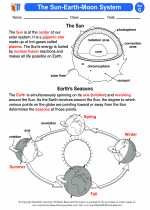 The Sun-Earth-Moon System
The Sun-Earth-Moon System  Activity Lesson
Activity Lesson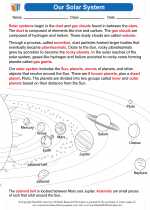 Our Solar System
Our Solar System  Worksheet/Answer key
Worksheet/Answer key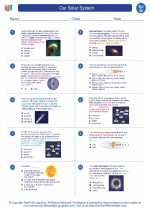 Our Solar System
Our Solar System  Worksheet/Answer key
Worksheet/Answer key Our Solar System
Our Solar System  Worksheet/Answer key
Worksheet/Answer key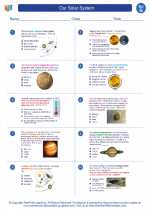 Our Solar System
Our Solar System  Worksheet/Answer key
Worksheet/Answer key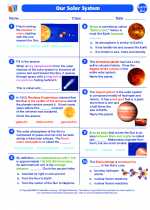 Our Solar System
Our Solar System  Vocabulary/Answer key
Vocabulary/Answer key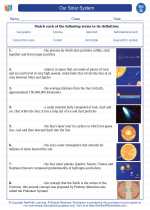 Our Solar System
Our Solar System  Vocabulary/Answer key
Vocabulary/Answer key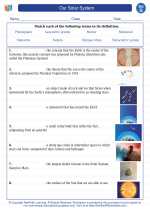 Our Solar System
Our Solar System  Vocabulary/Answer key
Vocabulary/Answer key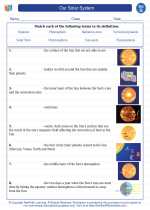 Our Solar System
Our Solar System 

 Activity Lesson
Activity Lesson
 Activity Lesson
Activity Lesson
 Worksheet/Answer key
Worksheet/Answer key
 Worksheet/Answer key
Worksheet/Answer key
 Worksheet/Answer key
Worksheet/Answer key
 Worksheet/Answer key
Worksheet/Answer key
 Vocabulary/Answer key
Vocabulary/Answer key
 Vocabulary/Answer key
Vocabulary/Answer key
 Vocabulary/Answer key
Vocabulary/Answer key
